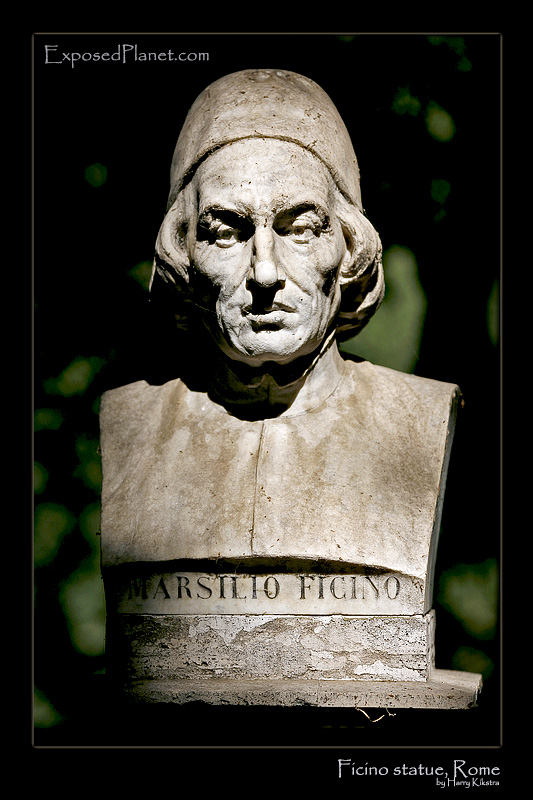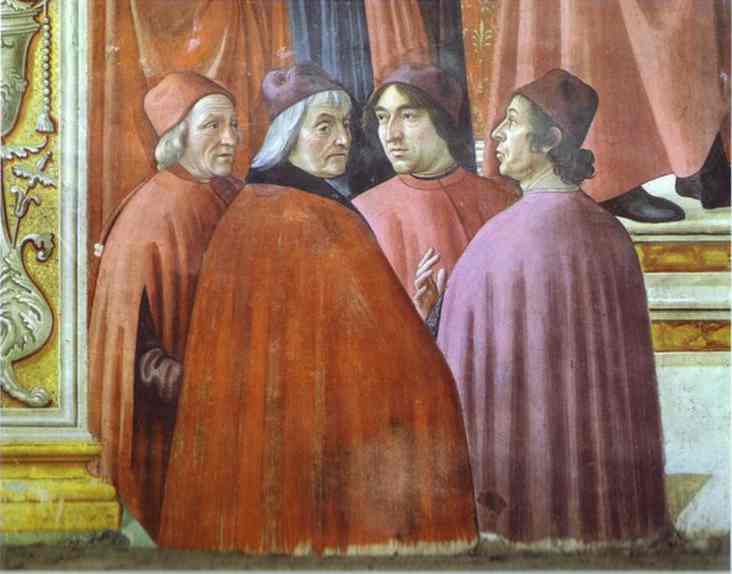<Back to Index>
- Philosopher Marsilio Ficino, 1433
- Pioneer Filmmakers Auguste Marie Louis Nicolas et Louis Jean Lumière, 1862 1864
- Empress of Korea Myeongseong, 1851
PAGE SPONSOR

Marsilio Ficino (Latin name: Marsilius Ficinus; October 19, 1433 - October 1, 1499) was one of the most influential humanist philosophers of the early Italian Renaissance, an astrologer, a reviver of Neoplatonism who was in touch with every major academic thinker and writer of his day, and the first translator of Plato's complete extant works into Latin. His Florentine Academy, an attempt to revive Plato's school, had enormous influence on the direction and tenor of the Italian Renaissance and the development of European philosophy.
Ficino was born at Figline Valdarno. His father was a physician under the patronage of Cosimo de' Medici, who took the young man into his household and became the lifelong patron of Marsilio, who was made tutor to his grandson, Lorenzo de' Medici. Giovanni Pico della Mirandola, the Italian humanist philosopher and scholar was another of his students.
During the sessions at Florence of the Council of Ferrara-Florence in 1438-1445, during the failed attempts to heal the schism of the Orthodox and Catholic churches, Cosimo de' Medici and his intellectual circle had made acquaintance with the Neoplatonic philosopher George Gemistos Plethon, whose discourses upon Plato and the Alexandrian mystics so fascinated the learned society of Florence that they named him the second Plato. In 1459 John Argyropoulos was lecturing on Greek language and literature at Florence, and Marsilio became his pupil.
When Cosimo decided to refound Plato's Academy at Florence, his choice to head it was Marsilio, who made the classic translation of Plato from Greek to Latin (published in 1484), as well as a translation of a collection of Hellenistic Greek documents of the Hermetic Corpus - particularly the "Corpus Hermeticum" of Hermes Trismegistos, and the writings of many of the Neoplatonists, for example Porphyry, Iamblichus, Plotinus, et al. Following suggestions laid out by Gemistos Plethon, Ficino tried to synthesize Christianity and Platonism.
Marsilio Ficino's main original work was his treatise on the immortality of the soul (Theologia Platonica de immortalitate animae). In the rush of enthusiasm for every rediscovery from Antiquity, Marsilio exhibited a great interest in the arts of astrology, which landed him in trouble with the Roman Catholic Church. In 1489 he was accused of magic before Pope Innocent VIII and needed strong defense to preserve him from the condemnation of heresy.
However, in 1513, fourteen years after Ficino's death, the Roman
Catholic Church declared the natural immortality of the soul as dogma;
a doctrine accepted later by many Protestant thinkers. Marsilio Ficino, writing in 1492, proclaimed, "This century, like a golden age, has restored to light the liberal arts, which were almost extinct: grammar, poetry, rhetoric, painting, sculpture, architecture, music... this century appears to have perfected astrology."
His letters, extending over the years 1474 – 1494, survive and have been published. He also wrote De amore and the influential De vita libri tres (Three books on life.) De vita,
published in 1489, provides a great deal of curious contemporary
medical and astrological advice for maintaining health and vigor, as
well as espousing the Neoplatonist view
of the world's ensoulment and its integration with the human soul.
"[...] There will be some men or other, superstitious and blind, who
see life plain in even the lowest animals and the meanest plants, but
do not see life in the heavens or the world [...] Now if those little
men grant life to the smallest particles of the world, what folly! what
envy! neither to know that the Whole, in which 'we live and move and
have our being,' is itself alive, nor to wish this to be so." One metaphor for this integrated "aliveness" is Ficino's astrology. In the Book of Life,
Marsilio details the interlinks between behavior and consequence. It
talks about a list of things that hold sway over a man's destiny. Ficino practiced love metaphysic with Giovanni Cavalcanti whom he made the principal character in his commentary on the Convivio, and to whom he wrote ardent love letters in Latin which were published in his Epistulae in
1492. Apart from these letters there are numerous indications that
Ficino's erotic impulses were directed towards men. After his death his
biographers had a difficult task trying to refute those who spoke of his homosexual tendencies.
However his sincere and deep faith, and membership of the Catholic
clergy, put him outside the reach of gossip and suspicions of sodomy.
Ficino died at Careggi. His memory has been honored with a bust in the south side of the nave in the cathedral of Santa Maria del Fiore in Florence.
